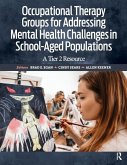Steven Taff, Lenin Grajo, Barbara Hooper
Perspectives on Occupational Therapy Education
Past, Present, and Future
Steven Taff, Lenin Grajo, Barbara Hooper
Perspectives on Occupational Therapy Education
Past, Present, and Future
- Broschiertes Buch
- Merkliste
- Auf die Merkliste
- Bewerten Bewerten
- Teilen
- Produkt teilen
- Produkterinnerung
- Produkterinnerung
Perspectives on Occupational Therapy Education: Past, Present, and Future outlines a path forward for occupational therapy educators, incorporating the impact of historical context, contemporary issues and trends, and international viewpoints on the development of the profession.
Andere Kunden interessierten sich auch für
![Quintessential Occupational Therapy Quintessential Occupational Therapy]() Robin AkselrudQuintessential Occupational Therapy81,99 €
Robin AkselrudQuintessential Occupational Therapy81,99 €![Occupational Therapy for Adults With Intellectual Disability Occupational Therapy for Adults With Intellectual Disability]() Kimberly BryzeOccupational Therapy for Adults With Intellectual Disability100,99 €
Kimberly BryzeOccupational Therapy for Adults With Intellectual Disability100,99 €![Qualitative Research Methodologies for Occupational Science and Therapy Qualitative Research Methodologies for Occupational Science and Therapy]() Qualitative Research Methodologies for Occupational Science and Therapy44,99 €
Qualitative Research Methodologies for Occupational Science and Therapy44,99 €![Occupational Therapy Groups for Addressing Mental Health Challenges in School-Aged Populations Occupational Therapy Groups for Addressing Mental Health Challenges in School-Aged Populations]() Brad EganOccupational Therapy Groups for Addressing Mental Health Challenges in School-Aged Populations80,99 €
Brad EganOccupational Therapy Groups for Addressing Mental Health Challenges in School-Aged Populations80,99 €![Quick Reference Dictionary for Occupational Therapy Quick Reference Dictionary for Occupational Therapy]() Karen JacobsQuick Reference Dictionary for Occupational Therapy124,99 €
Karen JacobsQuick Reference Dictionary for Occupational Therapy124,99 €![Cases in Pediatric Occupational Therapy Cases in Pediatric Occupational Therapy]() Susan CahillCases in Pediatric Occupational Therapy103,99 €
Susan CahillCases in Pediatric Occupational Therapy103,99 €![Occupational Therapy Interventions Occupational Therapy Interventions]() Catherine MerianoOccupational Therapy Interventions140,99 €
Catherine MerianoOccupational Therapy Interventions140,99 €-
-
-
Perspectives on Occupational Therapy Education: Past, Present, and Future outlines a path forward for occupational therapy educators, incorporating the impact of historical context, contemporary issues and trends, and international viewpoints on the development of the profession.
Hinweis: Dieser Artikel kann nur an eine deutsche Lieferadresse ausgeliefert werden.
Hinweis: Dieser Artikel kann nur an eine deutsche Lieferadresse ausgeliefert werden.
Produktdetails
- Produktdetails
- Verlag: Routledge
- Seitenzahl: 266
- Erscheinungstermin: 15. Januar 2020
- Englisch
- Abmessung: 254mm x 178mm x 14mm
- Gewicht: 507g
- ISBN-13: 9781630915476
- ISBN-10: 1630915475
- Artikelnr.: 58533736
- Herstellerkennzeichnung
- Libri GmbH
- Europaallee 1
- 36244 Bad Hersfeld
- gpsr@libri.de
- Verlag: Routledge
- Seitenzahl: 266
- Erscheinungstermin: 15. Januar 2020
- Englisch
- Abmessung: 254mm x 178mm x 14mm
- Gewicht: 507g
- ISBN-13: 9781630915476
- ISBN-10: 1630915475
- Artikelnr.: 58533736
- Herstellerkennzeichnung
- Libri GmbH
- Europaallee 1
- 36244 Bad Hersfeld
- gpsr@libri.de
Steven D. Taff, PhD, OTR/L, FNAP, FAOTA is the Director of the Division of Professional Education and Associate Professor in the Occupational Therapy and Department of Medicine Program, and Director of the Teaching Scholars Program at Washington University School of Medicine in St. Louis, Missouri. He is also co-founder of the Cross-Campus Educational Research Group, a multidisciplinary community of educational scholars and innovators at Washington University in St. Louis. Dr. Taff served as the Chair of the Commission on Education of the American Occupational Therapy Association (AOTA) from 2016 to 2019 and is also a member of the leadership group of the AOTA Scholarship of Teaching and Learning Program. He was a recipient of the Emerson Excellence in Teaching Award in 2017. Lenin C. Grajo, PhD, EdM, OTR/L is the Director of the Post-Professional Doctor of Occupational Therapy Program and Assistant Professor in the Programs in Occupational Therapy, Department of Rehabilitation and Regenerative Medicine in the Vagelos College of Physicians and Surgeons at Columbia University Irving Medical Center in New York, NY. Dr. Grajo was elected Chairperson of the Academic Education Special Interest Section (AESIS) of the AOTA and a member of the Commission on Education of AOTA from 2016 to 2019. Through AESIS, he has co-developed mentoring programs for new occupational therapy and occupational therapy assistant educators and fieldwork coordinators. He is a multi-awarded educator who has taught in the Philippines and the United States. Barbara R. Hooper, PhD, OTR/L, FAOTA is the occupational therapy doctorate Program Director and Division Chief at Duke University. Dr. Hooper is the director of the Center for Occupational Therapy Education (COTE), an education research and professional development center for occupational therapy educators and programs. Barb has been involved in several national-level occupational therapy education initiatives, including the American Occupational Therapy Foundation (AOTF) Curriculum Mentors project, AOTA Future of Education Task Force, founding committee for the AOTF (now AOTA) Scholarship of Teaching and Learning Program, co-author of the original AOTA Educational Research Agenda, and co-author of the previous AOTA Educational Philosophy Statement. She served as the principal investigator on a national study of occupational therapy education co-sponsored by the Society for the Study of Occupation-USA and the AOTF. She has received teaching awards at the University of New Mexico and Colorado State University.
Section I: Past Chapter 1: Educational Philosophies Influencing the
Development of Early Occupational Therapy Curricula Chapter 2: A Historical
Overview of Occupational Therapy Education Section II: Present Chapter 3:
Occupational Therapy Education in a Changing Health Care System: Current
Issues and Trends Chapter 4: Signature Pedagogies and Learning Designs in
Occupational Therapy Education Chapter 5: Bridging the Gap Between
Entry-Level Education and the Demands of Clinical Practice Chapter 6: Use
of Simulation in Occupational Therapy Education Chapter 7: Measuring
Educational Outcomes in Occupational Therapy: Course- and Curriculum-Level
Examples Chapter 8: Recent Developments in Educational Research and
Evaluation: A Vision for the Future of Occupational Therapy Education
Research Chapter 9: Supporting Diversity and Inclusion in Occupational
Therapy Education Chapter 10: The Principles of Occupation-Centered
Education Section III: Future Chapter 11: Internationalizing Occupational
Therapy Education: Designing Opportunities for Critical Engagement Across
Cultures Chapter 12: Perspectives on Occupational Therapy Education in
Southeast Asia Chapter 13: Perspectives on Occupational Therapy Education
in South America: Case of Brazil Chapter 14: Perspectives on Occupational
Therapy Education in Canada Chapter 15: Perspectives on Occupational
Therapy Education in Europe Chapter 16: Perspectives on Occupational
Therapy Education in Australia Chapter 17: Perspectives on Occupational
Therapy Education in Africa Chapter 18: Educational Technologies: Enhancing
Learning, Engagement, and Global Connectedness Chapter 19: Fieldwork
Education: New and Emerging Models to Support the Future of Practice
Chapter 20: Interprofessional Education: Where to Next? Chapter 21:
Imagining the Occupational Therapy Educational Landscape in 2050
Development of Early Occupational Therapy Curricula Chapter 2: A Historical
Overview of Occupational Therapy Education Section II: Present Chapter 3:
Occupational Therapy Education in a Changing Health Care System: Current
Issues and Trends Chapter 4: Signature Pedagogies and Learning Designs in
Occupational Therapy Education Chapter 5: Bridging the Gap Between
Entry-Level Education and the Demands of Clinical Practice Chapter 6: Use
of Simulation in Occupational Therapy Education Chapter 7: Measuring
Educational Outcomes in Occupational Therapy: Course- and Curriculum-Level
Examples Chapter 8: Recent Developments in Educational Research and
Evaluation: A Vision for the Future of Occupational Therapy Education
Research Chapter 9: Supporting Diversity and Inclusion in Occupational
Therapy Education Chapter 10: The Principles of Occupation-Centered
Education Section III: Future Chapter 11: Internationalizing Occupational
Therapy Education: Designing Opportunities for Critical Engagement Across
Cultures Chapter 12: Perspectives on Occupational Therapy Education in
Southeast Asia Chapter 13: Perspectives on Occupational Therapy Education
in South America: Case of Brazil Chapter 14: Perspectives on Occupational
Therapy Education in Canada Chapter 15: Perspectives on Occupational
Therapy Education in Europe Chapter 16: Perspectives on Occupational
Therapy Education in Australia Chapter 17: Perspectives on Occupational
Therapy Education in Africa Chapter 18: Educational Technologies: Enhancing
Learning, Engagement, and Global Connectedness Chapter 19: Fieldwork
Education: New and Emerging Models to Support the Future of Practice
Chapter 20: Interprofessional Education: Where to Next? Chapter 21:
Imagining the Occupational Therapy Educational Landscape in 2050
Section I: Past Chapter 1: Educational Philosophies Influencing the
Development of Early Occupational Therapy Curricula Chapter 2: A Historical
Overview of Occupational Therapy Education Section II: Present Chapter 3:
Occupational Therapy Education in a Changing Health Care System: Current
Issues and Trends Chapter 4: Signature Pedagogies and Learning Designs in
Occupational Therapy Education Chapter 5: Bridging the Gap Between
Entry-Level Education and the Demands of Clinical Practice Chapter 6: Use
of Simulation in Occupational Therapy Education Chapter 7: Measuring
Educational Outcomes in Occupational Therapy: Course- and Curriculum-Level
Examples Chapter 8: Recent Developments in Educational Research and
Evaluation: A Vision for the Future of Occupational Therapy Education
Research Chapter 9: Supporting Diversity and Inclusion in Occupational
Therapy Education Chapter 10: The Principles of Occupation-Centered
Education Section III: Future Chapter 11: Internationalizing Occupational
Therapy Education: Designing Opportunities for Critical Engagement Across
Cultures Chapter 12: Perspectives on Occupational Therapy Education in
Southeast Asia Chapter 13: Perspectives on Occupational Therapy Education
in South America: Case of Brazil Chapter 14: Perspectives on Occupational
Therapy Education in Canada Chapter 15: Perspectives on Occupational
Therapy Education in Europe Chapter 16: Perspectives on Occupational
Therapy Education in Australia Chapter 17: Perspectives on Occupational
Therapy Education in Africa Chapter 18: Educational Technologies: Enhancing
Learning, Engagement, and Global Connectedness Chapter 19: Fieldwork
Education: New and Emerging Models to Support the Future of Practice
Chapter 20: Interprofessional Education: Where to Next? Chapter 21:
Imagining the Occupational Therapy Educational Landscape in 2050
Development of Early Occupational Therapy Curricula Chapter 2: A Historical
Overview of Occupational Therapy Education Section II: Present Chapter 3:
Occupational Therapy Education in a Changing Health Care System: Current
Issues and Trends Chapter 4: Signature Pedagogies and Learning Designs in
Occupational Therapy Education Chapter 5: Bridging the Gap Between
Entry-Level Education and the Demands of Clinical Practice Chapter 6: Use
of Simulation in Occupational Therapy Education Chapter 7: Measuring
Educational Outcomes in Occupational Therapy: Course- and Curriculum-Level
Examples Chapter 8: Recent Developments in Educational Research and
Evaluation: A Vision for the Future of Occupational Therapy Education
Research Chapter 9: Supporting Diversity and Inclusion in Occupational
Therapy Education Chapter 10: The Principles of Occupation-Centered
Education Section III: Future Chapter 11: Internationalizing Occupational
Therapy Education: Designing Opportunities for Critical Engagement Across
Cultures Chapter 12: Perspectives on Occupational Therapy Education in
Southeast Asia Chapter 13: Perspectives on Occupational Therapy Education
in South America: Case of Brazil Chapter 14: Perspectives on Occupational
Therapy Education in Canada Chapter 15: Perspectives on Occupational
Therapy Education in Europe Chapter 16: Perspectives on Occupational
Therapy Education in Australia Chapter 17: Perspectives on Occupational
Therapy Education in Africa Chapter 18: Educational Technologies: Enhancing
Learning, Engagement, and Global Connectedness Chapter 19: Fieldwork
Education: New and Emerging Models to Support the Future of Practice
Chapter 20: Interprofessional Education: Where to Next? Chapter 21:
Imagining the Occupational Therapy Educational Landscape in 2050








